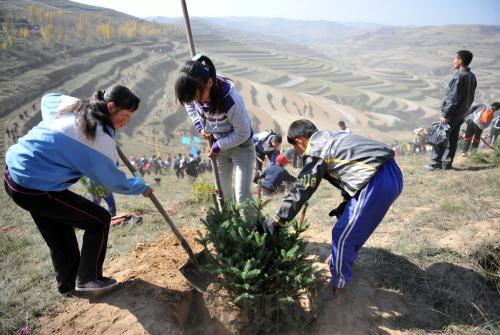|
 |
|
GREEN PLANET: Residents of Lanzhou, capital city of northwest Gansu Province, volunteer to plant trees on nearby hills (NIE JIANJIANG) |
"Initially, life without a car was so tiring for me," said Chen. "I had been driving for years and had forgotten about what it was like to walk or use public transportation."
Giving up the car on a beautiful day now allowed her to enjoy the fresh air and outdoor exercise, Chen said.
"You also no longer have to deal with the headache of finding parking spaces or getting stuck in terrible traffic jams," she said.
Joining forces
For many, converting to a low-carbon life has meant switching to more efficient home appliances or going on a low-carbon diet. But each individual has a limit to how much efficiency can be squeezed from his or her lifestyle. That's what motivated Zhang Shilin, a graduate student at Peking University, to influence others to change their carbon habits.
A member of a student-run environmental organization, 25-year-old Zhang helped organize speeches from professors to more than 20,000 university students in the capital city in the past two years while alerting his peers to the ominous shadow global warming is casting over the world's future. Once a month, Zhang and his friends plant trees in Beijing's suburbs to compensate for their personal emissions.
Before he became an ardent advocate for living a low-carbon life, Zhang said he was only aware of the looming threat of environmental degradation in its most basic sense. Zhang's commitment to green efforts came after watching a video segment of a Pacific island being swamped by sea and rainwater caused by climate change, at which point he grasped the reality of the havoc climate change could wreak on the planet.
"I was shocked and regretted not realizing the dangers earlier," he said.
Every morning, Zhang now monitors his carbon footprint with an online calculator. The numeric results represent how much he uses at home and for transportation, as well as how much garbage he produces and what is recycled. The calculator has helped Zhang figure out ways to cut back on his emissions. In extreme cases, Zhang has made a delicate airplane model out of disposed paper cups and recycled wastewater to flush his toilet.
"We regularly share low-carbon tips with other classmates and encourage and motivate each other to steer away from our past wasteful habits," said Zhang. "This is the basis for a sustainable eco-system that will reward us and our children's children for decades to come."
The traditional Chinese virtue of thrift seems to be adding an extra incentive for households to spend within their means, said Liu Xinyu, a senior researcher with the Shanghai Academy of Social Sciences. But this does not necessarily require a compromise on economic growth, as higher energy efficiency and productivity, as well as technological advances, will only act as contributory forces to the economy, he added.
Yang Fuqiang, an expert with the World Wildlife Fund, believes it is necessary for policymakers to hand out powerful policy incentives, such as raising retail electricity prices, to encourage rational consumption.
The consequences of an absence of policies would be devastating, said Yang, citing the United States as an example. After the Bush Administration withdrew from the Kyoto Protocol in 2001, U.S. carbon-cutting measures lagged behind Europe and Japan.
China still has considerable ground to cover before reaching its goal of a green economy despite a steep drop in energy consumption per unit of GDP (gross domestic product), said Zhang Monan, an economist with the State Information Center.
"Many Chinese are still hesitant to adopt low-carbon lifestyles, and reluctant to give up luxurious gas-guzzling cars and profligate spending habits—the only measurements of good life in their eyes," said Zhang.
| 